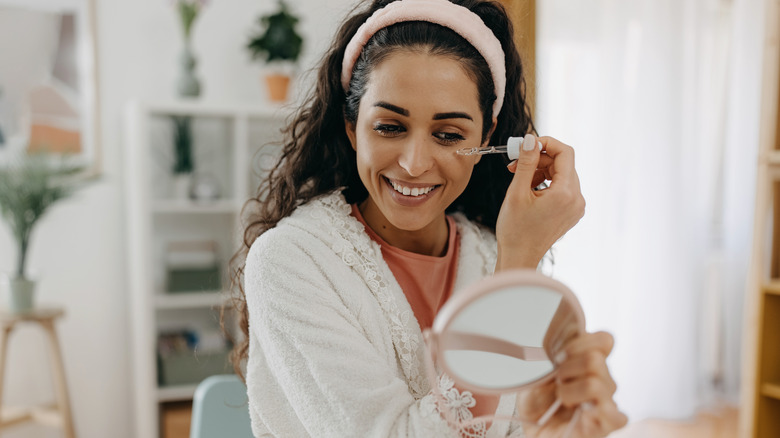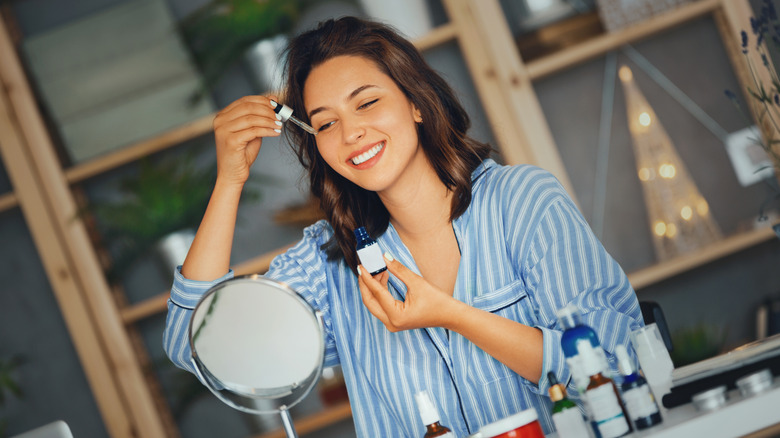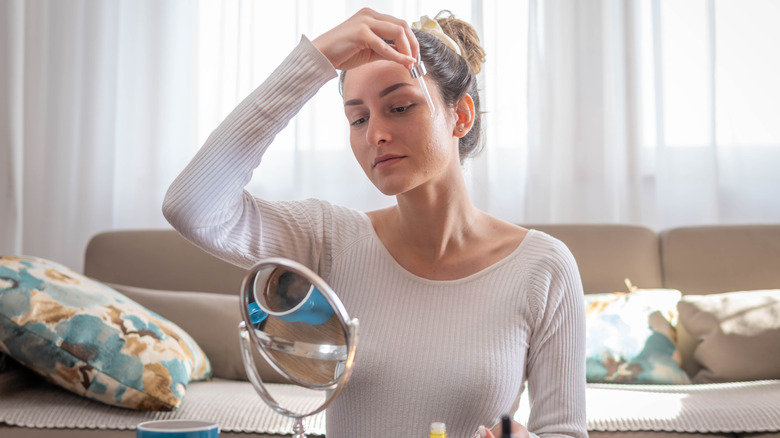Why Niacinamide & Zinc Are Better Together For Your Skin
There are a number of skincare combos out there that are absolute saviors when used together. But one incredible pairing that you may not think about much is niacinamide (which you may also know as nicotinamide) with zinc. These two ingredients have long been put together in the skincare world, and there are countless products in the shelves they appear in, such is the cult favorite The Ordinary Zinc + Niacinamide gel.
But, first thing's first. What actually are these two skincare ingredients? Well, although niacinamide isn't produced by the body naturally, it is a form of vitamin B3 derived from niacin, which supports body, brain, and skin function. That's why it's found in so many skincare products. Zinc also isn't produced naturally by the body, but it still plays a vital role in supporting its overall health. Some call it a holy grail ingredient for the skin because of the way it can improve its overall appearance from the inside — via supplements and the outside — and the outside, with serums, sunscreen, and moisturizer.
Given that these ingredients are essential to the body, it makes sense that they'd play well together on the skin. But while both are worthy of investigating on their own, working them both into your skincare routine could be key for doubling down on super common skin imperfections.
Niacinamide and zinc have a slew of benefits when applied to the skin together
If you suffer from sensitive or blemish-prone skin, using niacinamide and zinc together could be a game-changer. Both ingredients have calming properties that can help irritated skin. Topical zinc is a well-known skin soother and has been proven to tone down redness, even in people with rosacea and acne. Similarly, niacinamide also has soothing properties that ease inflamed skin and skin blotches, along with minimizing the appearance of textured skin and pores. Research has also linked both ingredients to being capable of regulating the skin's natural oil production, which could contribute to blemishes.
Per Fleur and Bee, using both ingredients in tandem can help skin appear more youthful. According to The Skincare Edit, niacinamide can strengthen the skin's collagen supply, as well as treat hyperpigmentation, which can brighten the skin's overall appearance. Zinc, meanwhile, can encourage your skin's elastin production, while also decreasing the melanin that causes dark spots. Zinc's also been known to fight off the damage that can be caused by everyday toxins and pollutants, while niacinamide can strengthen the skin's protective moisture barrier.
And they have a number of benefits apart too!
In addition to all of their joint benefits, niacinamide and zinc also have plenty of advantages separately that you'll still benefit from when mixing the two together. First and foremost, applying zinc topically can help your skin recover from damage. As Jordan Harper, founder and CEO of Barefaced, told Byrdie, "[Zinc] not only protects your skin from harm (think sunscreen), but it also helps to repair the skin and supports the wound healing process." Along with this, zinc is also capable of blocking ultraviolet rays, yet is gentle enough that it's even suitable for use on sensitive skin. This is why zinc oxide is commonly found in mineral sunscreens, which dermatologist swear by for acne-prone skin.
If that's not enough, zinc is great for keeping the skin properly hydrated. "[Zinc] helps skin stay moisturized by controlling transepidermal water loss and strengthening the skin's barrier function," Harper explained to Byrdie.
As for what niacinamide is bringing to the skincare table that zinc isn't doing? Per Cleveland Clinic, there's some research to suggest it can help with dark spots on the skin as well as decrease the appearance of hyperpigmentation in order to create a more even skintone. It's also thought by some that the product can help the skin form a healthy lipid barrier.
But remember to use niacinamide and zinc carefully
In most cases, it's safe to use a both topical niacinamide and zinc together, or a niacinamide serum and zinc moisturizer twice a day as part of your typical skincare routine. Professional serums tend to come in a 10% strength niacinamide and 1% zinc mix, which is suitable for most skin types, thought this can vary. If you notice any redness or irritation when you start using a mixture of the two, try applying the ingredients to the skin only once a day while it gets used to the change before slowly returning to twice a day.
If you go the supplements route, know that oral zinc in particular carries a risk of potential side effects. "If a person gets too much zinc, they may develop symptoms such as nausea, vomiting, stomach cramps, and headaches. Too much zinc can also lead to low copper levels and a weakened immune response," Danielle Frank, a senior dietitian at Top Balance Nutrition, told Byrdie. That's why it's important to consult with your doctor and/or dermatologist before introducing zinc products into your life to get a personalized recommendation regarding the right dosage for you. As for niacinamide, it's most important to make sure you're not allergic to the ingredient before using it. It's a good idea to apply a patch test to the skin at least 24 hours before using it for the first time, and as with any skin product, work it gradually into your routine before committing to daily use.



